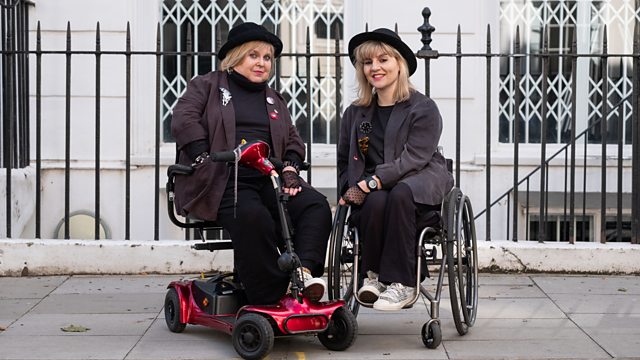Barbara Lisicki & Ruth Madeley, US basketball player Brittney Griner, Red Nose Day, Inclusive Britain, Native children in the US
When Barbara Lisicki met Alan Holdsworth the history of civil rights changed: the pair becoming the driving force behind the passing of the 1995 Disability Discrimination Act
Brittney Griner is 6 foot 9. She's an American basketball player, some say she's the greatest female basketball player of all time and she is currently being detained in Russia on drug charges that could carry a sentence of up to 10 years in prison. Overnight Russian courts have extended her detention for two more months. All this while tensions between Russia and the States remain tense and her family worry she may be used as a political pawn. Molly McElwee, the Telegraph's Women's Sports reporter explains.
To mark Red Nose Day Ena Miller visits a Comic Relief supported project helping survivors of domestic abuse. At Tower House Horses they use equine assisted learning to help women improve their mental health and recover their confidence. A woman we are calling Sophie tells her story and Susie, one of the co-founders of the project, explains how horses help women who have been through trauma.
Yesterday the government set out its plans to address racial disparities in the UK with changes to policing, health and education. Inclusive Britain: the government response to the Commission on Race and Ethnic Disparities sets out 70 plans including ones to tackle the differences in maternal health to ones referring to police powers. There also includes a plan to get a diverse panel of historians to, as the report puts it, ‘develop a new knowledge rich History Curriculum by 2024 exploring Britain’s historical past’. But how would that actually work in practice?
Kendra Mylnechuk Potter was adopted into a white family and raised with no knowledge of her Native background. A new film 'Daughter of a Lost Bird' currently showing at the Human Rights Watch Film Festival follows Kendra as she connects with her birth mother April, also a Native adoptee, and discovers her Lummi homelands in Washington state. Her story has parallels with many of those children affected by the 1958 Indian Adoption project, where Native children in the US were removed from their families and placed in white homes, dubbed by some as' cultural genocide'. In the late1970s the Indian Child Welfare Act came into force which prioritised keeping native Indian children within their own tribes. Anita speaks to Kendra and to the filmmaker Brooke Pepion Swaney.
The history of civil rights changed when Barbara Lisicki met Alan Holdsworth. The two were disabled cabaret performers in the 1980s when they met, fell in love and founded the disabled people’s Direct Action Network (DAN). They became the driving force behind the campaign that ultimately led to the passing of the 1995 Disability Discrimination Act. A new ����ý Two drama, Then Barbara Met Alan, tells their story. We hear from the real-life Barbara Lisicki, and Ruth Madeley, the actor who plays her.
Presenter: Anita Rani
Producer: Kirsty Starkey
Interviewed Guest: Molly McElwee
Interviewed Guest: Susan Little
Interviewed Guest: Dr Angelina Osborne
Interviewed Guest: Stella Dadzie
Interviewed Guest: Brooke Pepion Swaney
Interviewed Guest: Kendra Mylnechuk Potter
Interviewed Guest: Ruth Madeley
Interviewed Guest: Barbara Lisicki
Photo Credit: ����ý/Dragonfly
Last on
Comic Relief
Broadcast
- Fri 18 Mar 2022 10:00����ý Radio 4
Follow us on Instagram
Get all the pictures, videos, behind the scenes and more from Woman’s Hour
Podcast
-
![]()
Woman's Hour
Women's voices and women's lives - topical conversations to inform, challenge and inspire.


